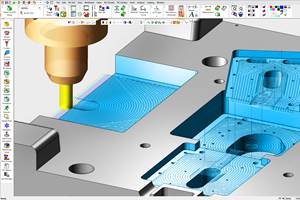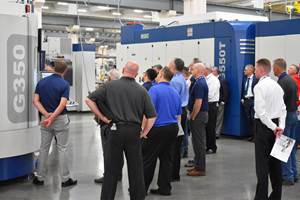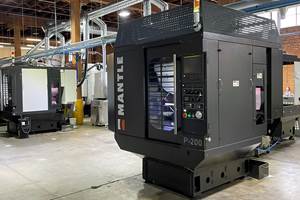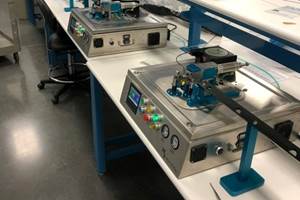Hard Milling Isn’t Just High Speed Machining
Milling complex forms in hardened tool steel involves more than just fast, light cuts, says this maker of medical-related injection molds. Here are some of the ingredients of an effective hard milling process.
Share




Here is video footage of hard milling taken at Eden Tool.
Eden Tool’s owner Mike Eden has a background in EDM, and he’s been running EDM machines since he was 14 years old. His shop in New Freedom, Pennsylvania started as an EDM shop. About three years ago, he invested in outfitting the shop with the ability to perform hard milling.
He might have made the investment sooner, he says. However, he knew that a lot of what he had been hearing about the importance of hard milling was fiction. “They said it would take away the need for sink EDM, but it never will,” he says. “Even as far as our shop has come with hard milling today, still there are many, many jobs where the geometry just demands EDM.”
However, he says the real value of hard milling is its consistency. This is the main reason the shop has cultivated the technique. Eden Tool makes injection molds used for precision medical components. Eight-cavity molds are common, and these require tight consistency from cavity to cavity. In fact, components of these molds are often replaced during the mold’s service life with the customer, so the replacements, too, need to be tightly consistent with the rest of the mold.
The reason EDM is less suited to this consistency does not relate to the accuracy of an EDM machine itself, but rather to the additional components and steps involved. EDM entails milling an electrode, running the EDM cycle and polishing the part. Electrode wear, along with differences in polishing technique, can affect the consistency of the final cavities and cores. Hard milling, however, produces geometrically complex parts to precise tolerances with little to no need for manual work after the machining is done.
Mr. Eden’s principal caveat is simply that succeeding at hard milling is not as easy as it looks.
More Than The Machine
There is a learning curve, he says. Milling details in hardened material with tools smaller than 1 mm in diameter requires various ways of thinking about the tool path and cutting parameters that are not necessarily equivalent to the way larger tools are used in softer work. Just having the right resources is an essential beginning—and those resources involve more than just the machine tool. Hard milling is not high speed machining, he says—not exclusively. Hard milling involves more than just the ability to take fast, light cuts.
The shop’s machining center for hard milling work is a Creative Evolution HSD 500 VMC capable of 30,000 rpm. Mr. Eden looked for more than just speed when evaluating the machine. Another vital consideration was spindle dynamics—how well the spindle could maintain low-vibration cutting at high rpm.
Tooling is equally important, he says. The shop uses shrink-fit toolholders to minimize runout. It also evaluates cutting tool vendors for their dimensional consistency from tool to tool. Among all of these considerations—spindle dynamics, runout, tool consistency—the common theme is avoiding even seemingly small sources of dimensional error. These small errors actually produce significant changes in load when the tools are tiny and the material is hard.
Software has to be chosen with the same sensitivity, he says. The shop uses CAM-Tool from CGS North America (Oldcastle, Ontario), a CAM software package tailored for complex 3D die/mold work. Mr. Eden says one of the merits of the software is the care with which its tool paths can avoid even slight changes in tool load that could compromise finish, accuracy or tool life. The shop once ran tool paths from this software in hardened tool steel against tool paths from a different (non-die/mold) CAM software machining the same geometry in graphite. In this comparison, the graphite cycle broke a tool, but the hard steel cycle did not.
Finally, arguably the most important process ingredient is the people, he says. Most of the process’s accuracy is attributable to the knowledge and attention of the people involved. Eden Tool is just a six-man shop. “We couldn’t do the kind of work we do without the set of people we have,” Mr. Eden says.
Related Content
Cimatron's Updated CAD/CAM Software Streamlines Mold Design
Eastec 2023: Cimatron V16 includes a clean new user interface and increased automation for faster mold design, electrode creation and NC programming.
Read MoreGrob Systems Inc. to Host Tech Event With Industry Partners
The 5-Axis Live technology event will highlight new machining strategies for optimizing the production of complex medical, aerospace and mold/die parts.
Read MoreIn Moldmaking, Mantle Process Addresses Lead Time and Talent Pool
A new process delivered through what looks like a standard machining center promises to streamline machining of injection mold cores and cavities and even answer the declining availability of toolmakers.
Read MoreFor This Machine Shop, Licensing Is the Answer to the Inventor’s Dilemma
Machine shops are natural inventors, but not necessarily suited to supporting and marketing a product. This Minnesota shop with an invention related to micromolding will share it through licensing.
Read MoreRead Next
Building Out a Foundation for Student Machinists
Autodesk and Haas have teamed up to produce an introductory course for students that covers the basics of CAD, CAM and CNC while providing them with a portfolio part.
Read MoreRegistration Now Open for the Precision Machining Technology Show (PMTS) 2025
The precision machining industry’s premier event returns to Cleveland, OH, April 1-3.
Read More5 Rules of Thumb for Buying CNC Machine Tools
Use these tips to carefully plan your machine tool purchases and to avoid regretting your decision later.
Read More



































